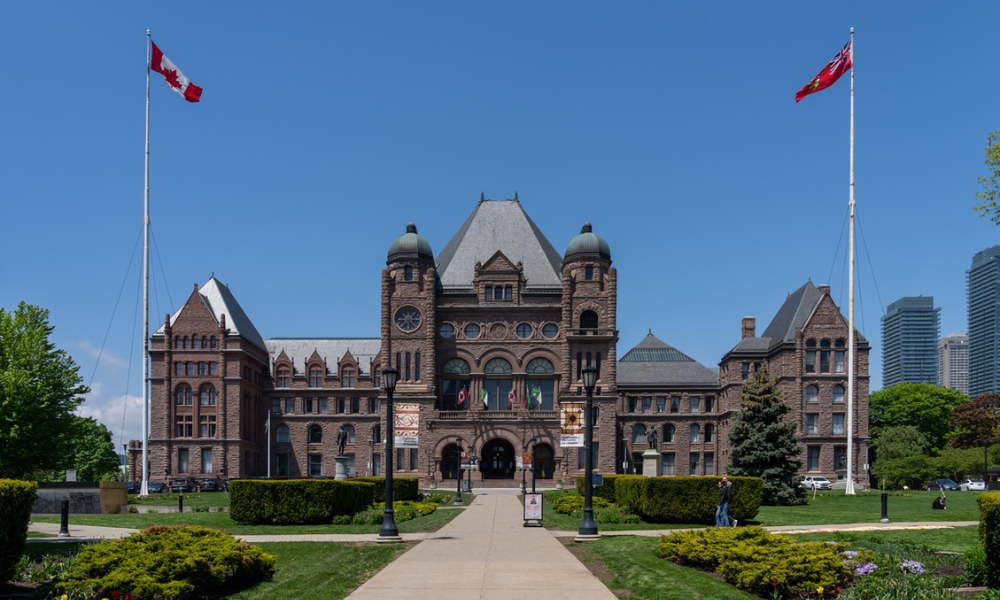
Actively gutting the program will undermine his aim of reducing court delays

Last month, amid mounting court delays and dwindling public confidence in the justice system, Ontario’s Ford government announced $29 million to appoint 25 new judges and hire 190 more Crown prosecutors, victim support workers, and court staff.
Sure, Ford has been dragging his feet when appointing judges, which has some folks whispering that he’s stacking the bench with his ideological buddies. But the fact is, we do need more judges. Anyone who's witnessed the utter circus inside our courtrooms knows we need more staff and fair compensation for them.
And then we have Ontario’s prosecutors, who are so overworked they probably don’t remember what sleep feels like. They are stretched thin, resulting in unreturned correspondence, delays in getting trial management meetings, and a lack of attention to some files.
However, one glaring omission in Ford’s list of new funding was legal aid.
It's no surprise that Ford excluded funding for legal services for Ontario’s most marginalized accused individuals. It’s what he does. From day one, Ford has not only excluded Legal Aid Ontario from these types of funding announcements, but he has actively worked to gut the program.
Last year, Ford allocated $112 million to strengthen the province’s bail system, which meant hiring more cops and prosecutors. In May 2023, Ford funnelled an additional $51 million to cops and prosecutors to crack down on auto theft. In 2021, Ontario pledged $75.1 million of new spending to “reinforce the fight against gun and gang violence” – and surprise, the cops and prosecutors got that, too. It’s like a broken record that keeps playing the same tune.
During the pandemic, when court shutdowns were causing defence lawyers to close shop, Ford spent over $72 million to tackle court backlogs, hiring over 340 new court employees, including Crown prosecutors, victim support staff, and bail vetters. And yet again, not a single cent for one of the justice system’s most crucial players.
And what are the results of Ford’s Daddy Warbucks routine? Spoiler alert: We haven’t stopped car theft or gang violence; the government still complains about a broken bail system, and court delays are worse than ever.
In an adversarial justice system, ignoring legal aid funding is like trying to build a house of cards on an already shaky foundation. Unrepresented accused not only face unfair and unjust outcomes but also become a bottleneck in the justice system, exacerbating court delays.
Cutting legal aid funding while fattening the wallets of every other justice system participant is, to use a technical term, absolutely bonkers.
It’s not enough to announce the money; Ford should care about how these resources are used. Let me tell you, there’s plenty of room for improvement.
Case in point: A few weeks ago, a client of mine pleaded guilty to being unlawfully in a dwelling and failing to comply with his bail conditions. It sounds like a scene from a heist movie, right? Wrong.
My client was homeless and grappling with mental health and addiction issues. He’d tried to get treatment, but waitlists were longer than the line for free hotdogs at Ford Fest. With no support and no roof over his head, he sought shelter in a vacant showroom condo. When he was found in the empty unit the following morning, the police were called, and he was arrested.
He was released on a $500 bail promise with a requirement to check in with the bail program. He missed one check-in, and boom, he was charged with breaching his bail. No “catch and release” exists because that’s not a thing. He was detained in jail.
He took responsibility for his actions, apologized to the court, and received a rehabilitative probation sentence. And then, in a move that shocked everyone, one of Ford’s newly hired prosecutors asked that his $500 bail promise be marked for estreatment.
Legal? Yes. Sensible? Absolutely not. Now, my client will be summoned to a hearing before a judge of the Superior Court, where a highly-paid prosecutor will spend valuable court time arguing that justice demands a homeless man pay $500 he doesn’t have for the non-violent bail breach of missing an appointment.
Increased justice spending will not reduce court delays if the money isn’t used wisely. Every minute the Crown spends on fools' errands, like this futile bail forfeiture, is a minute that can’t be used to prosecute the serious cases that are being thrown out of court due to delay. And every dollar funnelled to police and prosecutors is a dollar that could’ve funded crime prevention and social programs that work – like legal aid.
When the government opens the funding taps for judges, prosecutors, and court staff but starves impoverished accused, serious cases are tossed out due to delays and poor management, and more people than ever are languishing in Ontario’s inhumane jails, waiting for perpetually delayed trials, the public has every right to question if Ford genuinely wants to fix the crisis in our courts.